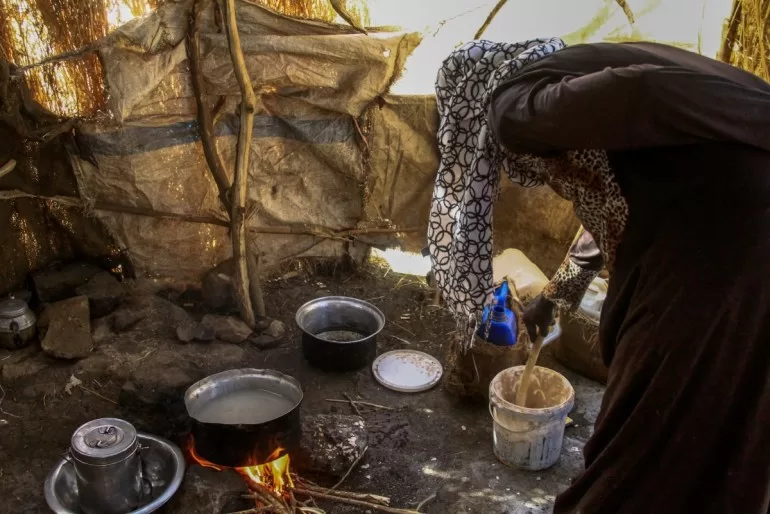The two warring parties, the Sudanese Armed Forces (SAF) and paramilitary Rapid Support Forces (RSF), have continued a longstanding struggle for power. Over the past year, violent clashes have killed nearly 16,000 people and displaced millions.
Thousands of desperate people are still fleeing the country daily “as if the emergency had started yesterday”, the United Nations reported on Tuesday this week.
Diplomatic efforts have failed to put an end to the crisis, which experts have said was partially triggered by an internationally backed plan to merge the RSF into the army.
Here’s what you need to know about Sudan’s war, the peacemaking efforts which have been undertaken since it broke out and what the humanitarian situation is now.
Why is there a war in Sudan?
The war in Sudan broke out on April 15, 2023, when a power struggle between the army chief, Abdel Fattah al-Burhan, and RSF commander Mohamed Hamdan “Hemedti” Dagalo reached a tipping point.
After Sudan’s ruler for nearly 30 years, President Omar al-Bashir, was toppled by a popular uprising in 2019, a fragile transition to civilian-led democracy was blown apart when al-Burhan and Hemedti staged a coup in 2021.
The army and the RSF initially shared power but an ensuing power struggle between the two was exacerbated by an internationally backed Framework Agreement in December 2022. This attempted to integrate the RSF into the army as part of a wider reform of the security sector and the transition to democracy.
While Western countries pressured the two sides to reach a deal quickly, promising aid and debt relief as incentives, each side feared ceding too much control to the other in a new political order.
“The Framework Agreement … brought to the fore key existential issues for both forces and their leaderships, such as [RSF] integration into a single army, military divestment from lucrative sectors of the economy and the prospect of [soldiers] facing justice for past abuses,” Jonas Horner, an independent researcher on Sudan, told Al Jazeera.
“Most of all … the two forces feared being left weaker than the other.”
Tensions between the two military forces reached boiling point in Khartoum on April 15 last year, when both forces sent armoured vehicles into the streets and they opened fire on each other.
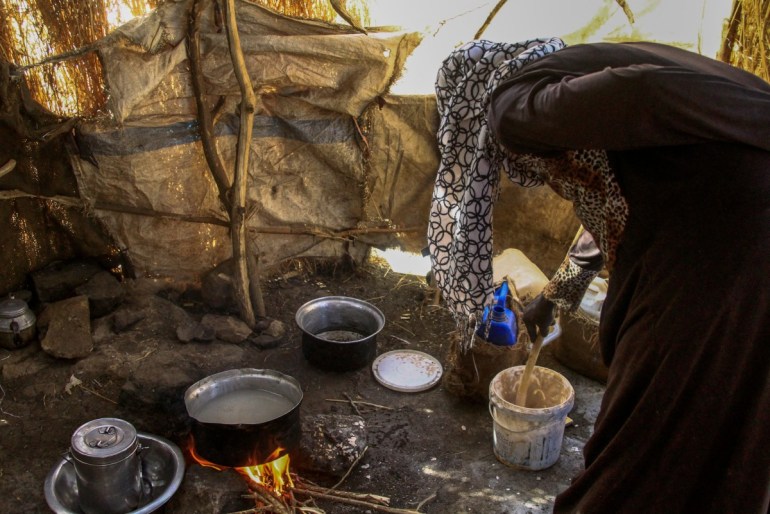
Who are the two opposing sides in this war?
The Sudanese Armed Forces (SAF) is Sudan’s national army, with an estimated 300,000 soldiers. Its military commander, General al-Burhan was a career soldier who climbed the ranks under President al-Bashir.
The RSF, on the other side, has approximately 100,000 well-equipped soldiers positioned across the capital, Khartoum, and the Darfur region, the group’s traditional stronghold.
The RSF evolved from Popular Defence Forces armed groups. During the Darfur conflict in the 2000s, government-backed Popular Defence Force groups (called Janjaweed by rebels) were accused of war crimes when al-Bashir’s government used them to help the army put down a rebellion.
In 2013, the RSF emerged out of Popular Defence Forces members and became an independent force under Hemedti, who hails from Darfur’s camel-herding Arab Rizeigat people and has largely been in hiding since war broke out in April. This year, he visited leaders of other African states including Uganda, a move which was viewed by experts as an attempt to gain legitimacy as a political actor.
“Hemedti desperately needs people to feel that the RSF is a governing force. I think this is why Hemedti went to meet heads of state,” said Kholood Khair, a Sudan expert and founding director of the think tank Confluence Advisory, which is based in Khartoum.
The RSF’s legitimacy as a ruling force was also seen as being supported by European policies such as the 2017 Khartoum Process, which designated and funded the group to act as border guards to stem African migration to Europe.
While the RSF currently holds the military upper hand in active combat zones, reports of their troops carrying out extrajudicial killings, being responsible for sexual violence and of looting aid, have severely undermined the group’s legitimacy among the Sudanese people.
“I think so many Sudanese … are never going to be comfortable with the RSF governing them,” said Horner, who has worked with various think tanks such as the International Crisis Group, based in Belgium.
“[The RSF’s] atrocities and their hardcore cruelty … is probably their single biggest obstacle and makes the prospect of them governing the country far more difficult,” Horner said.
Are any other groups involved in the war?
Several other groups have also taken up arms.
“Many of the fighters battling the RSF are highly motivated [hardline Muslim] forces seeking to reclaim Sudan. That ideological motivation counts for a lot next to those who are there for pay, as many RSF fighters are,” Horner told Al Jazeera.
Some of the armed groups are also loyal to the SAF.
Additionally, civilians formed a coalition of their own in October 2023, called “Taqaddum” or the Sudanese Coordination of Civil Democratic Forces.
This is led by Sudan’s former Prime Minister Abdallah Hamdok, and aimed to represent civilians in peace negotiations.
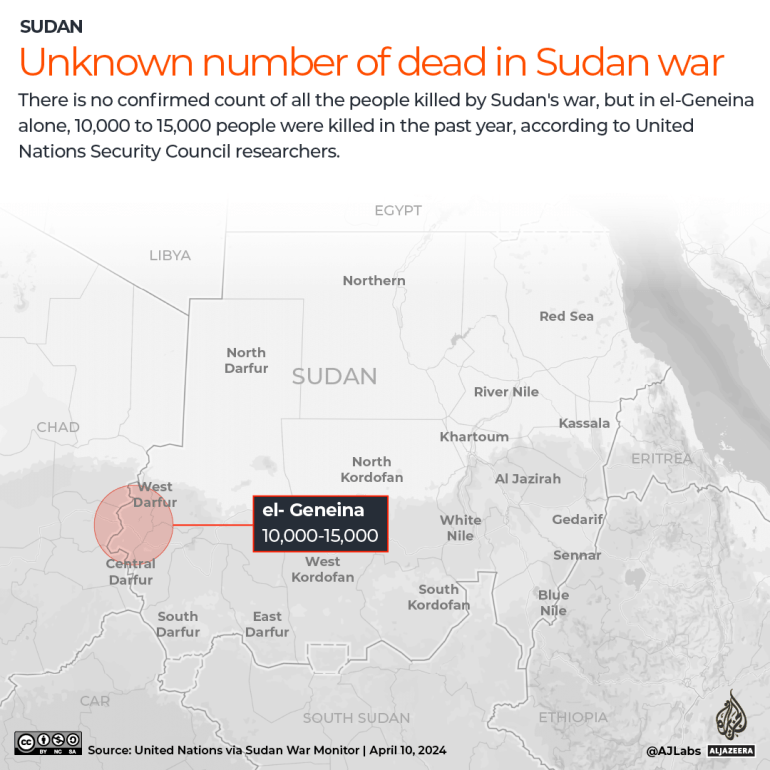
How many people have been killed?
The war has spread across several regions of the country and led to the collapse of infrastructural systems including healthcare and sanitation services, as well as causing thousands of deaths and the displacement of millions. The precise number of people killed is very unclear, with reports varying from one source to another.
As of April 2024, nearly 16,000 people, including military personnel, had been killed, according to the Armed Conflict Location & Event Data Project (ACLED). However, ACLED and experts have said those numbers are a significant undercount, due to the difficulty in collecting accurate, real-time data during a conflict of this nature.
A report by the UN refugee agency, UNHCR, in October stated that nearly 4,000 civilians had been killed and 8,400 injured in Darfur alone, between April 15 and the end of August. According to a UN report seen by Reuters in January, between 10,000 and 15,000 people had been killed in just one city – El Geneina, in Sudan’s West Darfur region – last year.
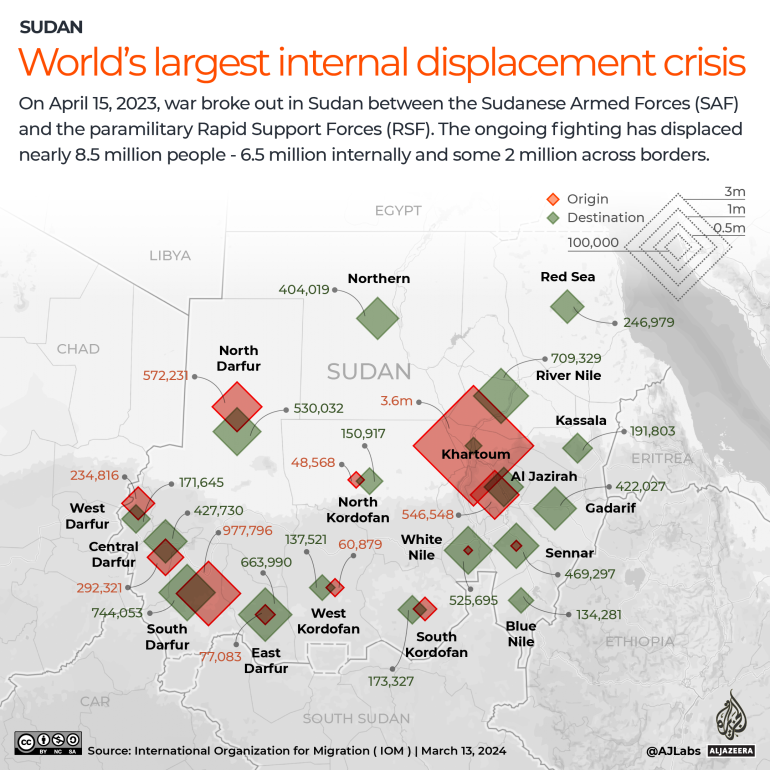
How many people have been displaced?
While some evacuation efforts were made in the early days of the war, these largely supported foreign nationals.
At least 8.2 million people out of Sudan’s 49 million population have fled their homes since the fighting broke out, according to the UN’s Office for the Coordination of Humanitarian Affairs (UNOCHA). Nearly 1.8 million of them have escaped across the country’s borders, mostly to Chad, Egypt, Ethiopia and South Sudan. Many have only been able to travel to those places by paying huge sums of money for bus tickets or by walking for days and enduring very difficult journeys.
At least 6.5 million have been internally displaced and are spread across Sudan’s 18 states. The largest numbers of internally displaced persons (IDPs) are in South Darfur, followed by River Nile and East Darfur. More than half of these people have been displaced from Khartoum state.
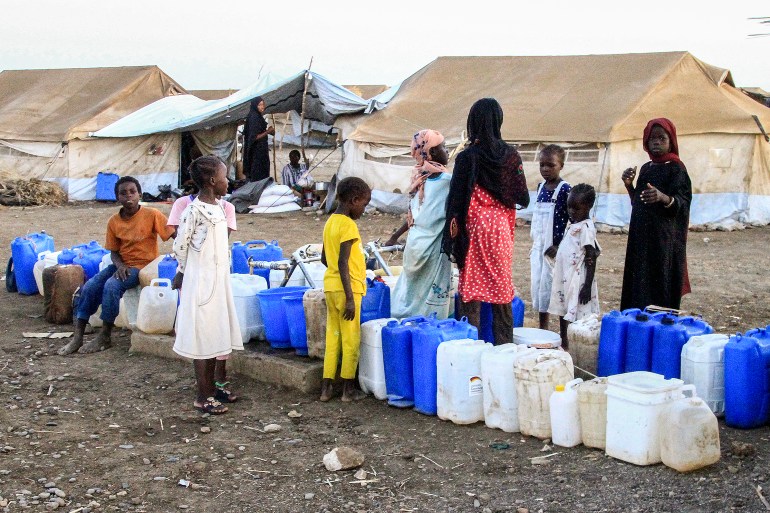
Which areas are worst affected by the fighting?
After fighting began in Sudan’s capital city, Khartoum, it spilled into Darfur as well as parts of Kordofan, Blue Nile states, and Merowe – a northern city near Egypt and River Nile which houses large gold mines and a military airport.
The war has pushed conflict-weary Darfur into an even more vulnerable position. There, Arab and non-Arab Masalit tribes have fought over scarce water and land resources for more than 20 years. Now, fighting has taken on its own ethnic dimension.
An increasing number of testimonies and documents have described attacks amounting to ethnic cleansing being perpetrated by Arab fighters alongside members of the RSF, which has denied such allegations.
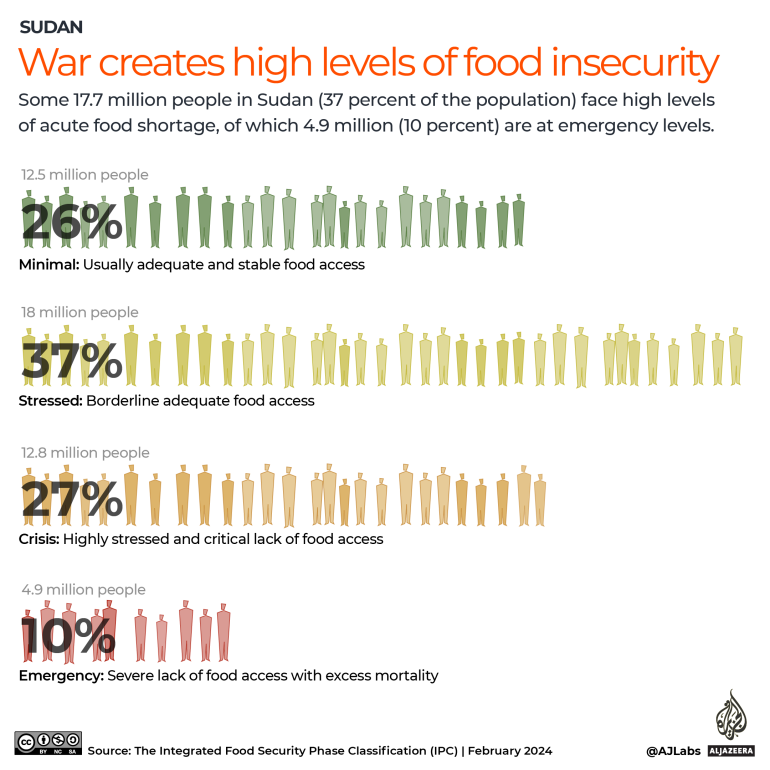
How have people in Sudan been affected?
Sudan is currently “experiencing a humanitarian crisis of epic proportions”, according to the UN. The country is grappling with acute shortages of essential items such as food, clean water, medicines and fuel. Prices have skyrocketed as a result of the scarcity.
Approximately half of Sudan’s 49 million people are in need of humanitarian assistance, the UN says. Nearly 18 million are also facing “catastrophe levels of food insecurity”, especially in parts of West Darfur, Khartoum, and among the IDPs.
Aid groups are struggling to provide humanitarian assistance because of blocked access, security risks and other logistical challenges. In March, the UN was able to distribute food aid to West Darfur for the first time in months.
Khair, director of Confluence Advisory, said famine has already taken hold in Sudan, but the UN, which relies on the SAF to gain access to the Port of Sudan, the fastest way to bring in aid by sea, has not yet confirmed this.
“We are living by this idea that the consent [of the army] in Port Sudan matters more than the people starving in [West Darfur]”, a Western aid worker who requested to remain anonymous told Al Jazeera. “[The UN] privileges the legal concept [of sovereignty] over a legitimate other legal concept, which is that people have a right to survive.”
Without a formal announcement of a famine, the usual levels of emergency aid and funding from international agencies and the international community are lacking.
How can famine be avoided?
Khair said that overcoming famine is not just about organisations donating food and grain in the short term.
The next agricultural season which begins in May, followed by harvest in September, must be safeguarded, she said, or famine will worsen even if there is international aid.
“Sudan is a breadbasket, has been a breadbasket for the region, Africa, and Arab countries like the Saudis, the Qataris and the Emiratis who have had over the past decades invested a large amount of money in Sudan to feed their populations”, she added.
How else are people in Sudan struggling?
Sudan has also been experiencing deadly outbreaks of diseases such as cholera, measles, and malaria, according to the UN’s Office for the Coordination of Humanitarian Affairs (UNOCHA). Meanwhile, about 65 percent of the population lacks access to healthcare and between 70 to 80 percent of hospitals in conflict zones are no longer functional due to air raids, supply shortages and attacks on healthcare workers by both sides in the war.
Critical infrastructure, such as water treatment plants and power stations, have also been damaged or completely destroyed in many places.
In Darfur, schools are closed, keeping millions from receiving an education or being able to benefit from a safe space, according to the UN’s refugee agency. Meanwhile, an increasing number of children have been separated from their families, and many have become exposed to sexual violence and trauma.
What efforts have been made to end the war?
Several efforts are under way to bring the war in Sudan to an end, but their lack of success has been linked to regional rifts between the mediating countries, as well as competing interests among international players such as Russia, the US, Saudi Arabia and the United Arab Emirates (UAE).
Several ceasefire agreements have been reached over the past year, but both sides have accused each other of continuing fighting in each case.
Negotiations between the warring sides are expected to begin in Jeddah, Saudi Arabia, on April 18. The city hosted several rounds of talks in 2023, before the army pulled out, citing the RSF’s ceasefire violations.
This time, however, there is speculation that two new actors may be included in the negotiations – Egypt, which has historically supported the SAF; and the UAE, which has sided with the RSF. “Every ceasefire that was negotiated failed because the two main regional backers of the warring parties were not present”, said Khair.
Talks are currently also ongoing in Cairo, led by the Emiratis and Egyptians. However, these are competing against the Saudi-backed Jeddah talks, and this internal tussle may hold back the international community’s potential to collectively drive peace, Khair added.
The United States has also tried to move to the forefront of mediation efforts concerning Sudan. In February, Washington named member of Congress Tom Perriello as a special envoy for Sudan, which may also create a larger shift in diplomacy on the war.
“US allies in the region – Egypt, Saudi Arabia, the UAE, Qatar – they now see that the US is giving much more attention to what’s going on in Sudan, and they want to be prepared to sort of align with that,” said Khair.
Another prominent actor in negotiations is the Intergovernmental Authority on Development (IGAD), a regional body, composed of eight countries around the Horn of Africa. In December 2023, IGAD said it had secured commitments from the army chief, al-Burhan, and RSF leader Hemedti to implement a ceasefire and hold political dialogue.
However, this was followed by al-Burhan suspending Sudan’s IGAD membership in January for inviting Hemedti to a summit.
Earlier in 2023, the bloc had set up a quartet committee including Kenya, Ethiopia, Djibouti and South Sudan to address the crisis. However, the army eventually boycotted a meeting, over accusations of Kenya’s lack of impartiality.
The Djibouti president, Ismail Omar Guelleh, is trying to bring al-Burhan back to the table for negotiations. “He’s one of the few that can, because Burhan sees all the other member states of IGAD, especially Uganda, Kenya, and Ethiopia, as too compromised, as too close to Hemedti to be neutral,” said Khair.
Following months of competing against Saudi Arabia for space in discussions, IGAD has also nominated an envoy for Sudan – Lawrence Korbandy – to be sent to the next Jeddah talks. Korbandy is a lawyer from South Sudan who previously served as a legal adviser to the country’s president, Salva Kiir.
Early in March, the UN Security Council also passed a resolution calling for a ceasefire during the Muslim holy month of Ramadan. The RSF did not respond to al-Burhan’s condition that the RSF should withdraw from provinces they had taken control of.
The African Union (AU) also attempted to broker peace last year. It began political dialogue among the country’s military, civilian and social actors in a bid to resolve the conflict and establish a transitional civilian government.
Unlike the Jeddah talks, the AU summit was attended by members of a civilian coalition which had shared power with the military before the 2021 coup. However, besides holding meetings, the AU efforts did not deliver meaningful results.
Khair said another issue is the existence of a “mosaic” of different armed actors – some of who are aligned with either the SAF or RSF – who are also driving the war in Sudan but who have not yet been included in peace talks. Their involvement in discussions will be essential, she said.
